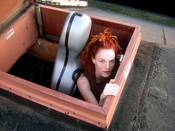 If WNYC’s RadioLab isn’t a staple of your podcast diet by now, it should be. No one else has embraced the medium’s unique characteristics as well. Each week brings astounding new discoveries, wrapped in a blanket of sonic textures that perfectly illustrate – never distract from – the subject of the episode. It was through a recent episode of RadioLab called Quantum Cello that I came across the stunning music of avant-cellist Zoe Keating.
If WNYC’s RadioLab isn’t a staple of your podcast diet by now, it should be. No one else has embraced the medium’s unique characteristics as well. Each week brings astounding new discoveries, wrapped in a blanket of sonic textures that perfectly illustrate – never distract from – the subject of the episode. It was through a recent episode of RadioLab called Quantum Cello that I came across the stunning music of avant-cellist Zoe Keating.
Don’t let the “avant” part turn you off — this music is accessible, fascinating, utterly beautiful, and works as well in the foreground as it does in the background (i.e. you can as easily close your eyes for deep listening as you can use it as a backdrop for hours-long coding sessions). There’s nothing wanky about it.
Zoe Keating: Tetrishead
Back-story: Keating was a classically trained cellist, on a fast track to the symphony. But despite her prodigious skill, debilitating stage fright kept her from advancing. In auditions, she’d forget entire compositions, drop the bow, and fall to pieces. But when playing solo, or playing her own work, she took flight. So “I bailed on the thing I loved the most.” Zoe ended up at Sarah Lawrence, creating film soundtracks for her art-major friends, who happened to have lots of effects pedals and sequencers laying around. It was there that Keating began to create her own sound, somewhere between Pablo Casals and the Kronos Quartet. Working on her own terms, not having to execute someone else’s compositions note-for-note, Keating’s stage fright virtually vanished. For her, experimenting with music was therapy. And her therapy is delicious to hear.
Her work with sequencers enables her to play live as though an ensemble unto herself, with one or two lines of classical cello and one or two lines of … something hard to put your finger on. Something warm and wiggly and textural, a romp through wonderous green clouds.

Keating’s cello sounds like these Mammatus clouds look
Despite the pedals and laptops that surround her in performance, Keating’s work never sounds electronic – it sounds like cello music, pure and simple. It’s not Bach, and she’s no Paolo Beschi, but I find Keating’s music every bit as warm and engrossing as that of the masters.
Her music is available on iTunes and Amazon MP3.